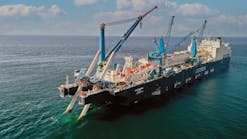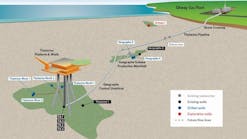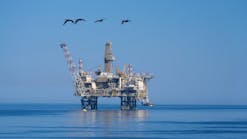I have been a part of Canada's East Coast oil and gas industry for 25 years, primarily working for a medium-sized independently owned engineering company in Newfoundland and Labrador. I have witnessed the emergence of a new industry in our country's youngest province. I have worked with many others to help grow the petroleum industry to where, within a year or so, we will be producing close to 50% of Canada's conventional light crude.
Some say that is quite an accomplishment, considering that less than 10 years ago we did not produce any oil. That's fair commentary, but I believe our place in this global industry should be more advanced.
I fully understand the price of oil has to be high enough to justify the costs of drilling. This is particularly a factor here in Newfoundland and Labrador, where there are long supply lines, icebergs, and a harsh environment. We counter that with the significant discoveries made offshore Newfoundland and Labrador with a success rate of one discovery per six wells drilled. And we also know that, based on experience with our existing projects, the challenges of the industry in Newfoundland and Labrador can be conquered – and conquered profitably. Today, there are many high risks facing the oil and gas industry globally:
- Fear of a terrorist attack against oil installations in Saudi Arabia, which currently produces 10 MMb/d
- Concerns about sabotage to the Iraqi oil pipelines, currently pumping 2 MMb/d
- Instability because of strikes and political unrest in Venezuela, now producing about 2 MMb/d
- Civil unrest in Nigeria, which produces 1.5 MMb/d
- Concern about the future of Yukos, which supplies about 1.7 MMb/d.
These are but a few of the risks in our industry. To those concerned about terrorism and political unrest, I say, "Look to Canada. Look to the east, to Newfoundland and Labrador."
Here, there is an environment where political risk simply does not exist. There are no terrorists in this part of the world who are trying to blow up our oil fields. There are no major strikes, nor political risk. And we are in close proximity to one of the largest markets for energy in the world – a market that can simply be described as energy-hungry.
These advantages seem like reasons enough to get drilling rigs positioned off our shores, don't they?
But even if we set aside those positive attributes, there is one critical reason remaining. That is our prospectivity – the untapped potential of another significant discovery offshore Newfoundland and Labrador.
Today, we have the Hibernia platform producing 200,000 b/d. We have an FPSO at Terra Nova that has produced beyond expectations for the past couple of years. And we have our third offshore project, White Rose, coming onstream in the next year or so.
Beyond these successful producing fields, we also have some of the world's most exciting geology. Exploration has led to discovered hydrocarbon resources totaling 2 Bbbl of oil and almost 10 tcf of natural gas. There are extensive seismic surveys happening off the south coast of Newfoundland in the Laurentian basin, where the Geological Survey of Canada estimates there could be 8-9 tcf of natural gas. And there is a large seismic program being conducted off the east coast of Newfoundland just north of the prolific Jeanne d'Arc basin – the home of the Hibernia, Terra Nova, White Rose and Hebron-Ben Nevis fields. This acreage is within the Orphan basin, which carried a work expenditure commitment of C$673 million and was recently awarded to ExxonMobil and Chevron Canada.
Industry has barely scratched the surface – drilling only 131 exploatory wells since the start of exploration off our coasts. Of these wells, the Canada Newfoundland Offshore Petroleum Board has determined that 23 warrant significant discovery designation. Internationally, this is considered a solid rate of success.
Our untapped potential has been estimated at 6 Bbbl of oil and over 50 tcf of natural gas. This undiscovered potential is awaiting confirmation by the bit.
Our governments understand the need to create an environment to attract exploration investment, and it is important to recognize the recent changes, if not milestones, that we have achieved.
Our national Minister of Natural Resources, John Efford, announced at this year's Offshore Technology Conference in Houston that there would be a five-year moratorium on import duties for MODUs. This alone will save operators tens of thousands of dollars every day. And there are more changes coming – designed to shorten the length of time to get an offshore project approved.
There is no better time than now to set your sights on this virtually untapped exploration frontier. To quote Ed Byrne, minister of natural resources for Newfoundland and Labrador, "A great deal more offshore territory beckons to those who are searching for the next lucrative discovery."
Besides all that, we're nice people!
Rob Strong
Vice president, Davis Engineering St. John's, Newfoundland
This page reflects viewpoints on the political, economic, cultural, technological, and environmental issues that shape the future of the petroleum industry. Offshore Magazine invites you to share your thoughts. Email your Beyond the Horizon manuscript to Eldon Ball at [email protected].




